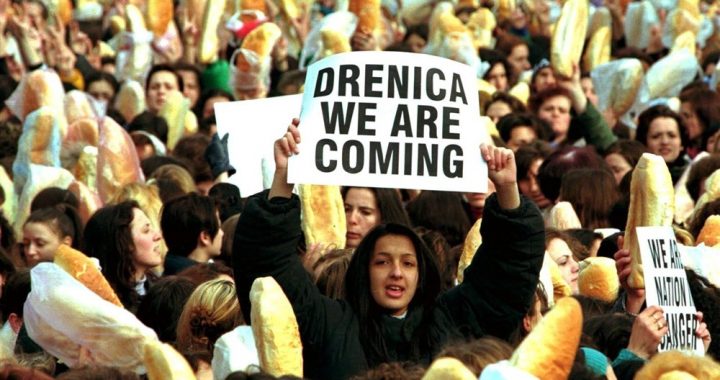

 As hundreds of others carry loaves of bread, an ethnic Albanian woman raises above her head a placard declaring "Drenica we are coming" during a protest march in the centre of Pristina, the capital of Kosovo, 16. March 1998. About 1,000 Albanian women began their march today towards Drenica, main trouble spot in the flashpoint Serbian province of Kosovo, to show solidarity with the local population.
EPA-PHOTO/EPA/ANJA NIEDRINGHAUS/NIE/nie/ow
As hundreds of others carry loaves of bread, an ethnic Albanian woman raises above her head a placard declaring "Drenica we are coming" during a protest march in the centre of Pristina, the capital of Kosovo, 16. March 1998. About 1,000 Albanian women began their march today towards Drenica, main trouble spot in the flashpoint Serbian province of Kosovo, to show solidarity with the local population.
EPA-PHOTO/EPA/ANJA NIEDRINGHAUS/NIE/nie/ow
‘Women of Freedom’, a documentary that highlights the role played by Kosovo women in the movement for freedom during the years of oppression by Slobodan Milosevic’s regime, is being given its Prishtina premiere.
The documentary ‘Women of Freedom’, about women activists in the 1990s when Kosovo was under the control of Slobodan Milosevic’s repressive Yugoslav regime, is being shown for the first time in Prishtina on Thursday evening at the Armata cinema.
The film directed by Lum Çitaku follows the women’s struggle for freedom through the narratives of seven of the main protagonists, culminating in mass protests in Kosovo in 1997 and 1998, the year that the armed struggle against the Milosevic regime began.
“The film is based on numerous stories of participants in the women’s political movement at that time, especially the actions and organisation of protests for freedom and independence,” Çitaku told BIRN.
“It is a testimony and a chronology of war, resistance, and sacrifice of Kosovo women as a crucial part of Albanians’ movement for freedom and independence,” he added.
The documentary focuses on the March for Drenica, a mass protest by women after the start of armed hostilities in 1998.
On March 16, 1998, with a loaves of bread in their hands and placards with the slogan “Stop the Genocide”, thousands of Kosovo Albanian women walked from Pristina to the town of Drenica in solidarity with the people displaced after the outbreak of fighting between Serbian forces and the guerrillas of the Kosovo Liberation Army.
“Thousands of people were in the mountains [around Drenica] without any help. We took bread and wanted to give the message of peace,” Melihate Termkolli, one of those involved in the march, told BIRN.
“We had bread not guns in our hands, calling for help and international humanitarian aid,” she added.
The marchers were prevented from reaching Drenica by the police, however.
“After we were turned back by police, we left the bread in front of the International Red Cross, the American Liaison Office in Kosovo, and Council for the Defence of Human Rights and Freedoms [NGO],” she recalled.
Termkolli, then a human rights activist and member of the Women’s Forum of the Democratic League, the movement led by Ibrahim Rugova that later became a political party, said that women’s activism was at the centre of the non-violent civil resistance movement in pre-war Kosovo.
However, she said that in the history of the movement for freedom in Kosovo, women’s participation has gone largely unrecognised.
“I hope this documentary brings more attention to women’s activism and aids our collective memory,” she said.
16 February 2023 - 11:31

Kosovo PM Albin Kurti first came to power in a landslide win in 2021, ...

In Kosovo’s public discourse, early pregnancies are frequently portr...

A significant portion of the information consumed by the citizens of K...

Former intelligence agency chief Driton Gashi was sentenced to four ye...